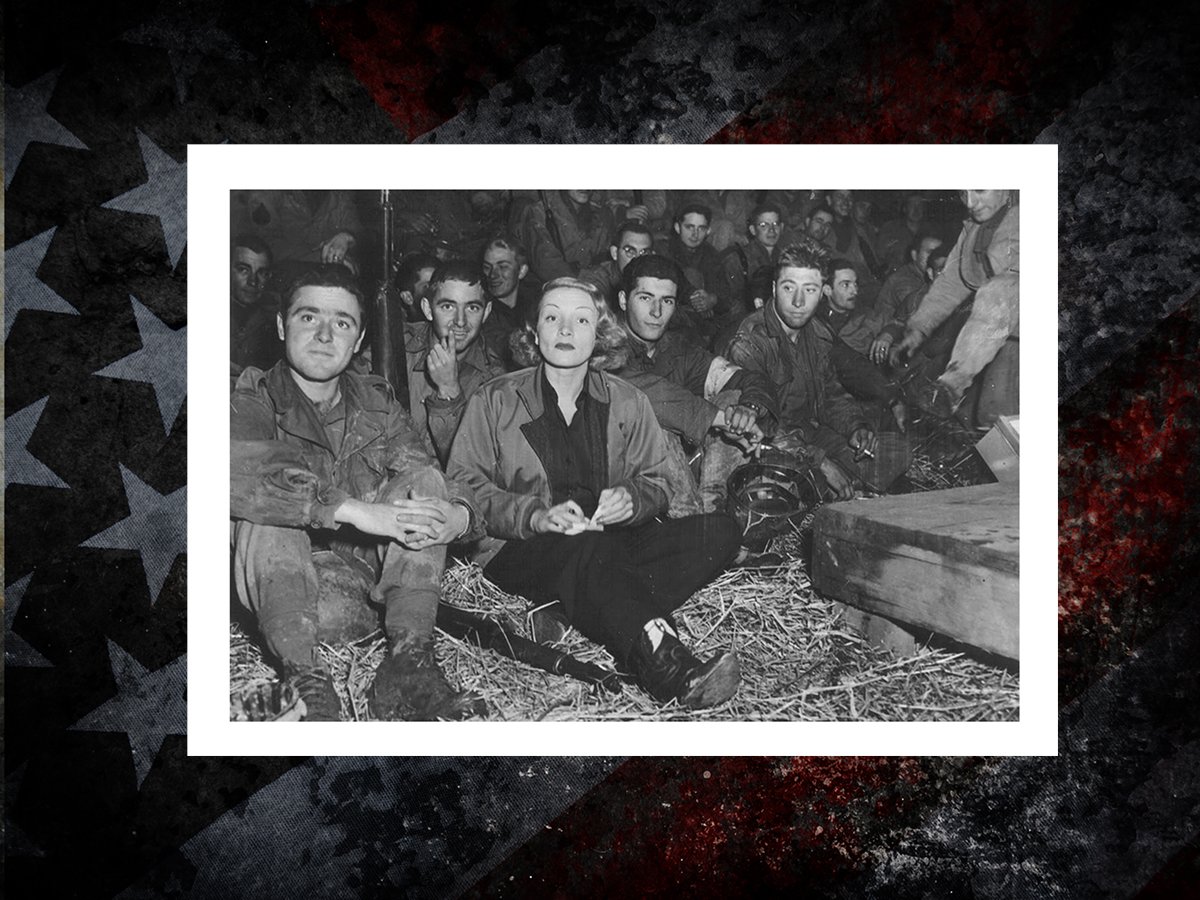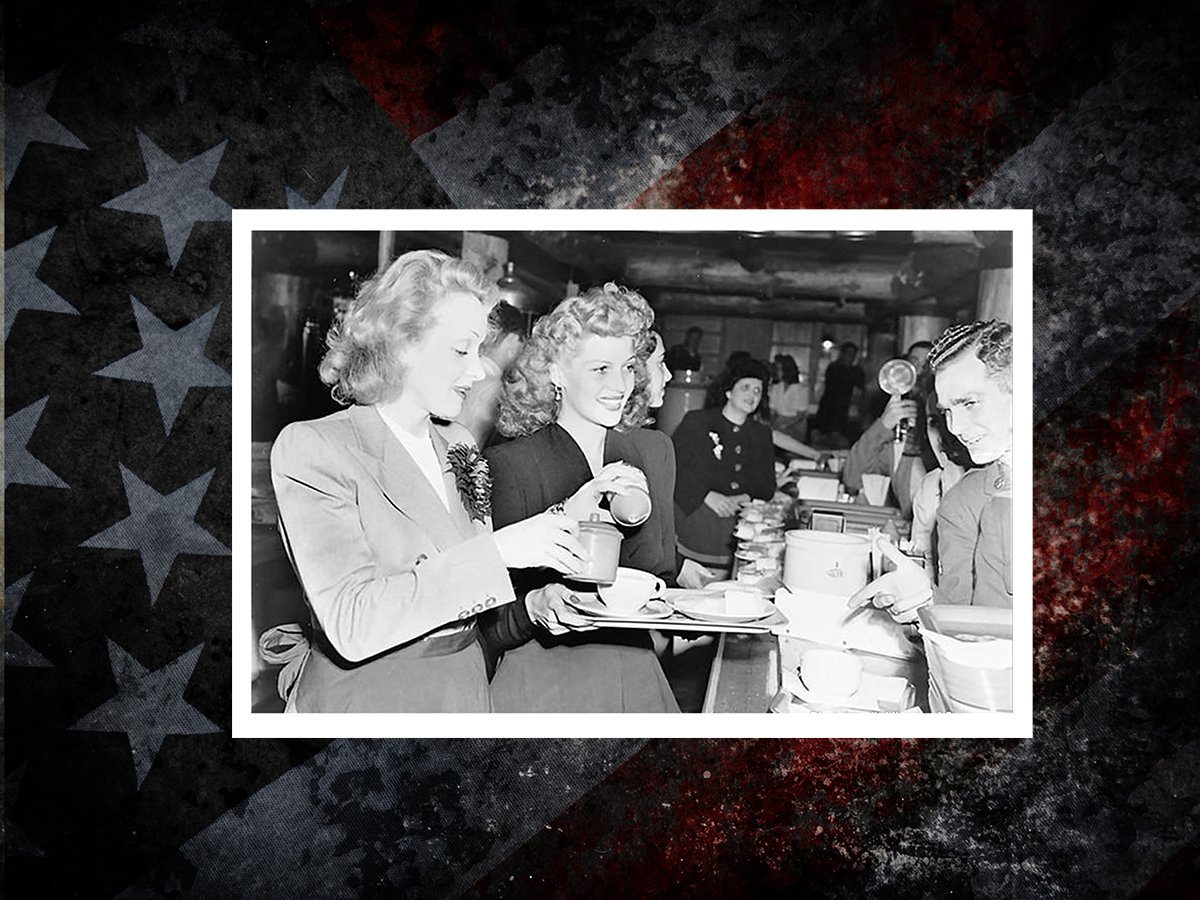Marlene Dietrich: The Blond Bombshell Who Broke the Nazis With Her Voice

Dietrich and U.S. soldiers somewhere in France during her second USO tour (1944). Photo courtesy of Wikimedia Commons. Composite made by Matt Fratus/Coffee or Die Magazine.
The blond bombshell was a megastar by 1937. Made famous by the movie The Blue Angel in 1930, Marlene Dietrich was Germany’s most revered actress, singer, and performer. She was independent and expressive, both in her openness in her bisexuality and in her bravery to set fashion standards not previously accepted or explored for the decade. When Joachim von Ribbentrop, Nazi Germany’s top diplomat, approached Dietrich to star in the Führer’s Nazi propaganda films, he didn’t expect the answer to be “no.”
Dietrich had a problem, and his name was Adolf Hitler. “Hitler is an idiot,” Dietrich said in a wartime interview broadcast from Britain to Germany. “Boys, don’t sacrifice yourselves. The war is crap.”
Her refusal to join the Nazi regime cast her as a traitor, and it took years even after World War II for the citizens in Berlin to accept her. In the meantime, she applied for American citizenship, moved to Hollywood, and was soon contacted by a lawyer named William J. Donovan. To his peers, “Wild Bill” was far more than an Ivy League hotshot from Columbia; he was a World War I Medal of Honor recipient who was tasked with establishing a premier paramilitary and intelligence unit called the Office of Strategic Services (OSS).
Donovan recruited Dietrich to use her voice to record a series of anti-Nazi propaganda songs for the OSS Morale Branch. She recorded the songs “Time on My Hands,” “Mean to Me,” and “Taking a Chance on Love” in German to demoralize German and Italian troops. The US Strategic Bombing Survey said “the programs were just as devastating to German morale as an air raid.”

Dietrich’s most beloved song, sung in both English and German, was the love song “Lili Marlene.” The Nazis initially banned the song, but after receiving numerous letters in the mail by Axis soldiers, they accepted it.
“If she had nothing more than her voice she could break your heart with it,” Ernest Hemingway told Life magazine. “But she has that beautiful body and the timeless loveliness of her face. It makes no difference how she breaks your heart if she is there to mend it.”
In 1947, Dietrich was awarded the Medal of Freedom for her wartime service. Like so many in her era, from schoolteachers and law practitioners to a future famous chef and a son of a famous father, Dietrich assisted the Allies when they came calling.

Matt Fratus is a history staff writer for Coffee or Die. He prides himself on uncovering the most fascinating tales of history by sharing them through any means of engaging storytelling. He writes for his micro-blog @LateNightHistory on Instagram, where he shares the story behind the image. He is also the host of the Late Night History podcast. When not writing about history, Matt enjoys volunteering for One More Wave and rooting for Boston sports teams.
BRCC and Bad Moon Print Press team up for an exclusive, limited-edition T-shirt design!
BRCC partners with Team Room Design for an exclusive T-shirt release!
Thirty Seconds Out has partnered with BRCC for an exclusive shirt design invoking the God of Winter.
Lucas O'Hara of Grizzly Forge has teamed up with BRCC for a badass, exclusive Shirt Club T-shirt design featuring his most popular knife and tiomahawk.
Coffee or Die sits down with one of the graphic designers behind Black Rifle Coffee's signature look and vibe.
Biden will award the Medal of Honor to a Vietnam War Army helicopter pilot who risked his life to save a reconnaissance team from almost certain death.
Ever wonder how much Jack Mandaville would f*ck sh*t up if he went back in time? The American Revolution didn't even see him coming.
A nearly 200-year-old West Point time capsule that at first appeared to yield little more than dust contains hidden treasure, the US Military Academy said.












